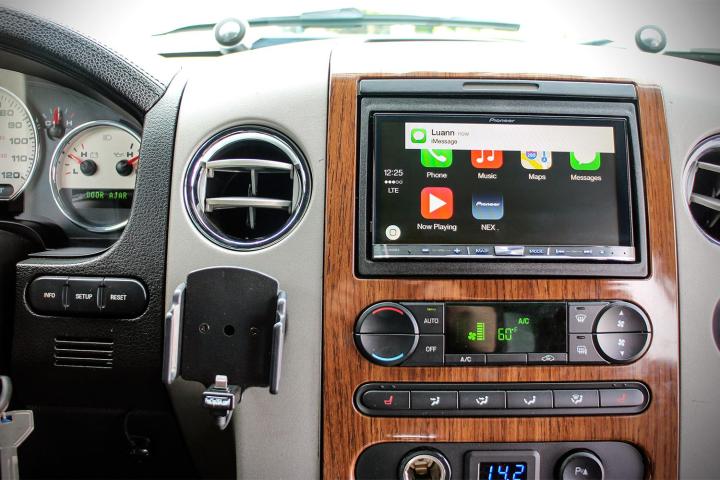
It took a while since it was first introduced, but Apple’s CarPlay is finally available in aftermarket car audio systems, including five of Pioneer’s NEX in-dash receivers and one brand-new offering, announced today.
Pioneer announced this evening that owners of the AVIC-8000NEX ($1400), AVIC-7000NEX ($1200), AVIC-6000NEX ($900), AVIC-5000NEX ($750) and AVIC4000NEX ($700) are eligible for a firmware update that will make their existing in-dash receivers CarPlay ready. The company also announced a new addition to its lineup, the AppRadio 4 (SPH-DA120 – $600) which, at $600, sits as the least expensive way to put CarPlay in your ride.
To upgrade their receivers with the new CarPlay functionality, existing owners of eligible in-dash receivers need only snag a USB thumb drive and head to www.pioneerelectronics.com/firmware to download the firmware, free of charge. Pioneer cautions self-installers that the USB port 1 in its head units must be used in order to install the new firmware. Those not interested in the DIY method can head to authorized Pioneer dealers to have the update professionally installed — a dealer locator is available here.
For those not familiar, CarPlay is a new version of Apple’s mobile operating system that’s been designed for use in the car. The idea is to move popular functions to an in-dash touchscreen in order to eliminate the need to pick up a phone while driving (which is both dangerous and also illegal in most US states). With CarPlay, users have the option to have Siri read text messages aloud, then dictate a response, make or receive phone calls with Siri’s assistance, navigate using Apple Maps, and listen to their music, podcasts and, of course, iTunes Radio. Users must have the latest version of iOS installed on their iPhone 5, iPhone 5c iPhone 5S, iPhone 6, or iPhone 6 Plus.
In addition to the Siri-assisted functions listed above, certain popular apps will be available on-screen with one-touch access, just as they would be on an iPhone or iPad. When we test drove a beta version of CarPlay a few months ago, Pandora was present, but notably absent was Spotify. Since then, Apple has added Spotify, along with Beats Music and a handful of other apps, in a list of apps which will eventually be supported. Exactly when these apps will be available remains unknown, according to Pioneer .
Digital Trends has an AVIC-8000NEX installed and will be taking CarPlay on the road for a hands-on report and full review. Check back soon for a full report on Apple’s play to expand its reach into your car.



